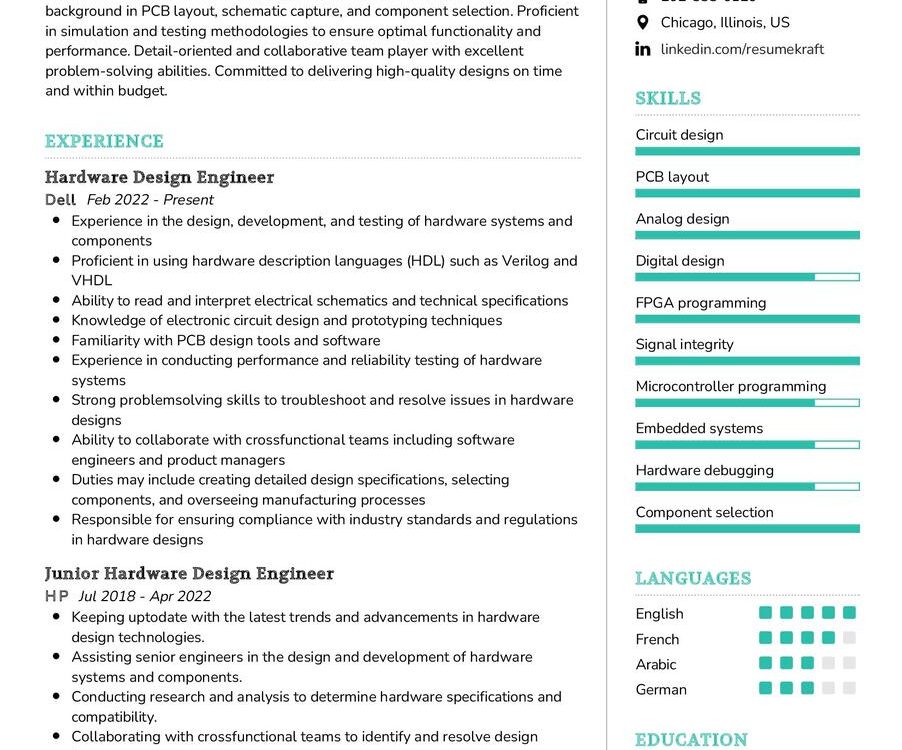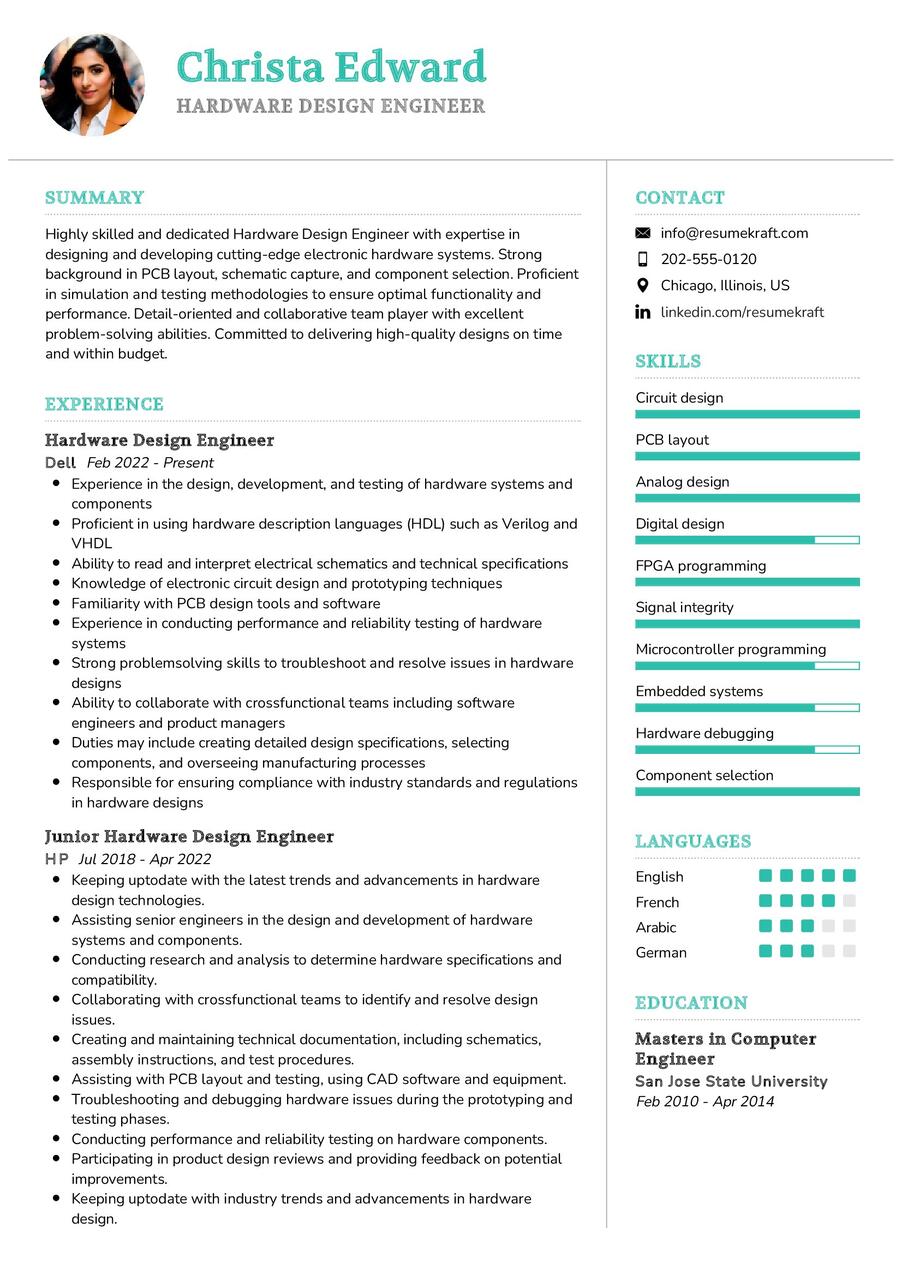Exploring the Role of a Hardware Design Engineer
As technology continues to advance at a rapid pace, the role of a Hardware Design Engineer has become increasingly crucial in the innovation landscape. This position requires a unique blend of technical prowess and creative problem-solving skills, steering engineering teams towards creating cutting-edge hardware solutions. Let’s delve deeper into the multifaceted role of a Hardware Design Engineer, a position that demands a deep understanding of hardware architecture coupled with the ability to lead a team effectively.
Key Responsibilities of a Hardware Design Engineer
A Hardware Design Engineer is at the forefront of developing and implementing hardware solutions that drive technological progress. Their responsibilities encompass a range of tasks, from conceptualizing designs to ensuring the seamless integration of hardware components. Let’s explore the key responsibilities that define this dynamic role:
- Designing and developing hardware architecture for electronic systems, ensuring functionality and efficiency.
- Collaborating with cross-functional teams to understand project requirements and constraints.
- Conducting feasibility studies and risk assessments to anticipate and address potential challenges in hardware designs.
- Creating and reviewing technical documentation, including schematics, PCB layouts, and design specifications.
- Prototyping and testing hardware components to validate performance and identify areas for improvement.
- Optimizing hardware designs for cost-effectiveness, manufacturability, and energy efficiency.
- Staying abreast of industry trends and emerging technologies to incorporate innovative solutions into hardware designs.
Each responsibility demands precision and innovation, shaping Hardware Design Engineers into leaders in the ever-evolving tech landscape.
Qualifications and Skills Required for a Hardware Design Engineer
Becoming a successful Hardware Design Engineer requires a combination of education, technical expertise, and problem-solving skills. Let’s delve into the qualifications and skills needed to excel in this role:
- A Bachelor’s or Master’s degree in Electrical Engineering, Computer Engineering, or a related field, showcasing a strong foundation in hardware design principles.
- Proficiency in hardware description languages such as VHDL or Verilog.
- Experience with hardware design tools and software, such as CAD programs and simulation software.
- Strong analytical and problem-solving skills, with the ability to troubleshoot and optimize hardware designs.
- Excellent communication skills to effectively convey complex technical concepts to cross-functional teams and stakeholders.
- Leadership and project management skills to guide a team through the hardware design process.
- Knowledge of industry standards and regulations related to hardware design and development.
Securing additional certifications in specific hardware design technologies can enhance your profile and demonstrate your commitment to staying at the forefront of the field.
Crafting Your Hardware Design Engineer Resume
As you embark on the journey to create a standout resume for the role of a Hardware Design Engineer, consider these tips to effectively showcase your skills and experiences:
- Highlight specific hardware design projects you’ve led, detailing the impact and outcomes.
- Quantify your achievements with metrics, showcasing tangible results of your hardware designs.
- Include relevant coursework, projects, or internships that demonstrate your practical experience in hardware design.
- List any publications, patents, or presentations related to hardware design to highlight your contributions to the field.
- Tailor your resume for each application, emphasizing the skills and experiences most relevant to the specific hardware design job.
Your resume is not just a document but a narrative of your journey and contributions as a Hardware Design Engineer.
Hardware Design Engineer Resume Summary Examples
Your resume summary is the first impression potential employers will have of your capabilities. Craft a powerful snapshot of your hardware design journey with these examples:
- “Results-driven Hardware Design Engineer with a proven track record in developing innovative electronic systems, leading teams to successful project outcomes.”
- “Detail-oriented Electrical Engineer specializing in hardware design, adept at optimizing designs for performance, cost, and manufacturability.”
- “Experienced Computer Engineer with expertise in FPGA-based design, leading projects from conception to production with a focus on efficiency and reliability.”
Each summary is an opportunity to showcase your unique strengths and contributions as a Hardware Design Engineer.
Experience Section for Your Hardware Design Engineer Resume
Your experience section is the heart of your resume, where you narrate your hardware design journey. Consider these examples to effectively communicate your experiences:
- “Led a team in developing a power-efficient hardware solution, resulting in a 15% reduction in energy consumption for the client.”
- “Pioneered the integration of advanced sensors into a hardware system, enhancing its capabilities and market competitiveness.”
- “Managed the hardware design phase of a project, ensuring on-time delivery and compliance with industry standards.”
Each experience entry is a chapter in your hardware design story, showcasing your ability to drive successful outcomes.
Educational Section for Your Hardware Design Engineer Resume
Your educational background is a key aspect of your hardware design journey. Highlight your academic achievements with examples like:
- Master of Science in Electrical Engineering, XYZ University, specializing in VLSI Design, 2019.
- Bachelor of Science in Computer Engineering, ABC University, honing hardware design skills, 2016.
- Certified Hardware Design Professional (CHDP), showcasing expertise in industry-recognized hardware design practices, 2020.
Your educational journey is a testament to your dedication to mastering the skills needed for successful hardware design.
Skills Essential for a Hardware Design Engineer Resume
Your skill set is your toolkit, showcasing the abilities that set you apart as a Hardware Design Engineer. Let’s explore the essential soft and hard skills for success in this role:
Soft Skills:
- Problem-solving abilities, crucial for identifying and addressing challenges in hardware design.
- Effective communication, to convey complex technical concepts to diverse audiences.
- Collaboration and teamwork, essential for working with cross-functional teams in the hardware design process.
- Attention to detail, ensuring precision in designing and implementing hardware solutions.
- Adaptability, to navigate changes and evolving requirements in the hardware design landscape.
Hard Skills:
- Proficiency in hardware description languages, such as VHDL or Verilog.
- Experience with CAD programs and simulation software for hardware design.
- Knowledge of industry standards and regulations related to hardware design.
- Leadership and project management skills to guide hardware design projects to successful completion.
- Understanding of electronic components and systems architecture.
Each skill is a valuable asset in your arsenal, contributing to your success as a Hardware Design Engineer.
Common Mistakes to Avoid When Writing a Hardware Design Engineer Resume
As you craft your resume, steer clear of common pitfalls that can hinder your success in landing a hardware design role:
- Avoid using generic language; instead, tailor your resume to highlight your unique contributions and experiences.
- Quantify your achievements with specific metrics to showcase the impact of your hardware designs.
- Include relevant keywords from the job description to pass through applicant tracking systems (ATS).
- Proofread your resume to eliminate typos or errors that could diminish your professional image.
- Ensure your resume is well-organized and easy to read, with clear sections and bullet points for easy navigation.
Avoiding these mistakes will help you create a compelling resume that stands out in the competitive field of hardware design.
Key Takeaways for Your Hardware Design Engineer Resume
As you craft your Hardware Design Engineer resume, keep these key takeaways in mind:
- Highlight your specific hardware design achievements to showcase your impact on projects.
- Quantify your successes with metrics, providing tangible evidence of your contributions.
- Emphasize your unique skills, both soft and hard, that make you an invaluable asset in hardware design.
- Tailor your resume for each application, showcasing the skills and experiences most relevant to the specific hardware design job.
Armed with these insights and tips, you are ready to create a standout Hardware Design Engineer resume that tells your unique story of innovation and success.
Finally, feel free to utilize resources like AI Resume Builder, Resume Design, Resume Samples, Resume Examples, Resume Skills, Resume Help, Resume Synonyms, and Job Responsibilities to create a standout application and prepare for the Hardware Design Engineer job interview questions.


